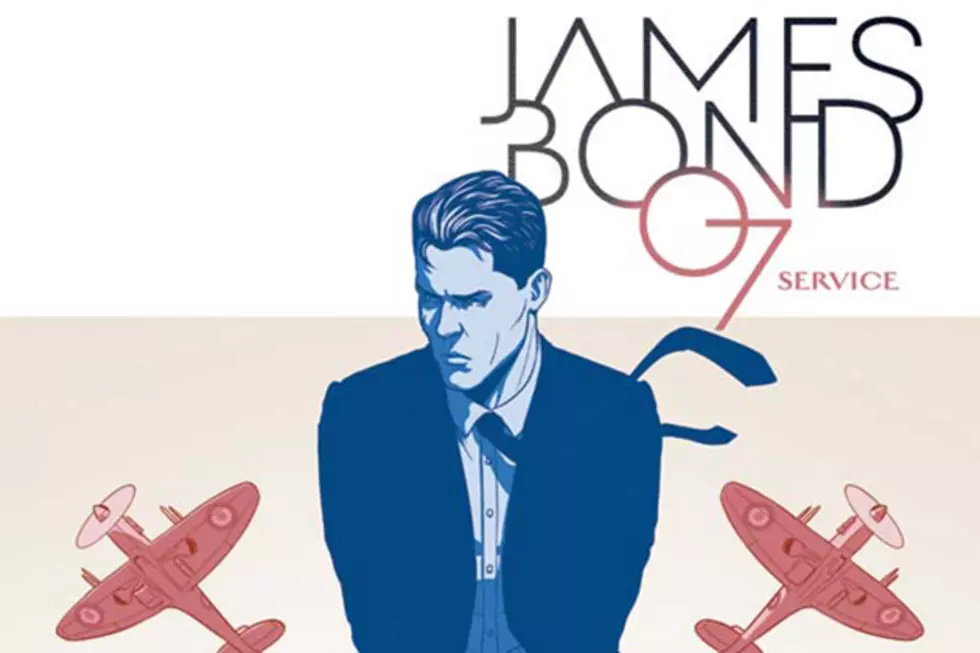
Oh Snap! The Godlike Genius of ‘The Wicked + The Divine’
The mark of a great pop song is not just that it's a pleasure to hear and hear again, but that it rewards struggling with it. Kieron Gillen and Jamie McKelvie have been conflating pop music and comics since they first collaborated on Phonogram ten years ago; Gillen's described the central conceit of their new series The Wicked + The Divine as "gods as pop stars, and pop stars as gods." That's a good way of describing the story itself -- but the comic is also about presenting Gillen and McKelvie as pop stars, and as pop mechanics. It's the product of a decade spent working out what makes comics click, and how to make them speak to a mass audience.
I've been fortunate enough to read the first two issues of The Wicked + The Divine; they're marvelous, a little bit maddening, and thoroughly worth wrestling with.
To put it in musical terms: Phonogram was a couple of fans, in love with the artifacts of pop, discovering that they could make something with their own voice. Their fifteen-issue take on Young Avengers, published across the course of last year, was experienced punks playing with pop gear, Chumbawamba realizing that they'd been at it long enough to make people dance if they wanted to. The Wicked + The Divine is Gillen and McKelvie as Lennon and McCartney, sitting down to "write a swimming pool," or Benny Andersson and Björn Ulvaeus, sweating out the hooks of "Waterloo."
Gillen, when he's on, is one of the most meticulous conceptualists in mainstream comics. He doesn't do the tick-tock formalism of, say, Alan Moore -- there's a lot of structural fluidity -- but he generally works toward a particular tone and effect, and seems to have an endgame in mind from the beginning. (His run on Journey Into Mystery was buffeted from one crossover or tie-in to another, but its final episode revealed the whole thing's plan to have been in place all along.) McKelvie's great strength as an artist, and the core of what makes him work so well with Gillen, is his commitment to clarity; even when he's doing formally tricky stuff, like the action scenes in Young Avengers or the spectacular sequence at the end of W/D #2, it's all about guiding the eye, letting characters' actions and expressions carry the story, and freeing up Gillen's language to play more.
The opening scenes of The Wicked + The Divine only need to give us a few glimpses of the world Gillen and McKelvie have built for us to understand how extensive that worldbuilding already is. The series announces its aesthetic with the 1-2-3-4 count-in of its first issue -- the count-in of "I Saw Her Standing There," and also of the Ramones. And its attitude -- one that has a lot to do with the way pop music is consumed in the UK, but is rarely seen in comics -- is here is your new object of worship. W+D is very, very aware that the cultural currency of the moment is measured in cosplay and Tumblr, and it plays to that. In the five days its first issue has been public, it seems to be working as planned, despite everybody's inability to spell "divine."
The two major human characters so far are all but signposted as models for how to experience the story: Laura is the aspirational fan who wants to become a god herself, Cassandra is the proleptic voice of irritated engagement-via-critique. The writerly darlings that might have been killed in the first couple of issues are the darlings that will be reblogged again and again. When Luci (the teenage-girl-as-Thin-White-Duke character who will be the subject of hair-and-makeup tutorials on YouTube any day now if she's not already) is identified as Lucifer and snaps "hey, you guessed my name," it's as on-the-nose as could be, but damned if it's not a thrilling moment too.
Like most Big New Things, W+D is also the product of a carefully selected lineage to which it alludes freely. (1990s-era Vertigo comics, Gillen has not been shy about mentioning, are a major reference point -- the first issue, in particular, repeatedly echoes the beginning of The Invisibles.) It also belongs, intentionally or not, to a tradition of mainstream comics creators signaling a new stage of their maturation by wrestling with divinity: New Gods, A Contract with God, From Hell, Preacher.
Fortunately, its first pair of issues are as confident an opening cut as any of those projects had. They're cocksure, contemporary and perverse, light entertainment from a brutally heavy place. The Wicked + The Divine announces up front that it's constructed for the moment rather than for the long haul, which is a smart move on Gillen and McKelvie's part. That's the only way pop ever gets to be immortal.
The Wicked + The Divine #1 is on sale now in finer comics shops and digitally from Image Comics and ComiXology. Issue #2 is available for pre-ordr now.
More From ComicsAlliance

![Bond After Brexit: Kieron Gillen Declassifies ‘James Bond: Service’ [Interview]](http://townsquare.media/site/622/files/2017/03/Service_McKelvie-feat.jpeg?w=980&q=75)

![Comics’ Sexiest Female Characters (From A Queer Perspective) [Love & Sex Week]](http://townsquare.media/site/622/files/2017/02/hg_featured.jpg?w=980&q=75)


![The Hero We’ve Been Waiting For: ‘America’ #1 By Gabby Rivera And Joe Quinones [Preview]](http://townsquare.media/site/622/files/2017/02/America_1_Featured.jpg?w=980&q=75)


